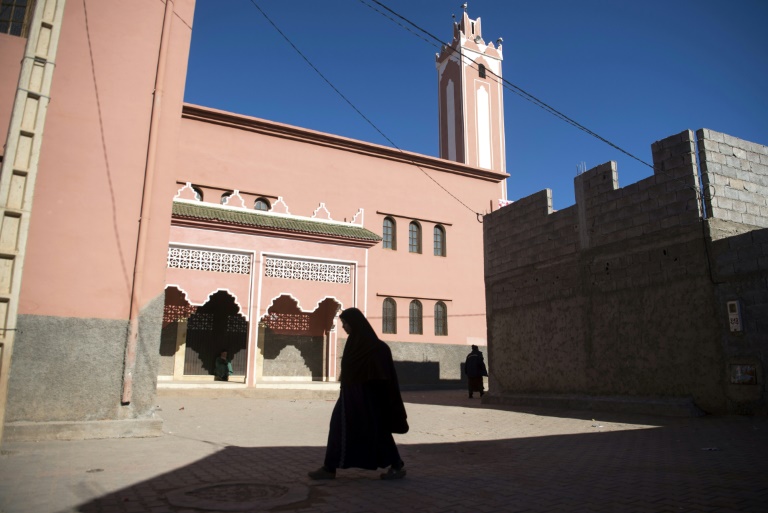
CASABLANCA - A powerful earthquake struck Morocco late Friday night, killing hundreds of people and damaging buildings and historic landmarks in cities including the tourism hub of Marrakech.
Morocco’s Interior Ministry said early Saturday that at least 296 people died in provinces near the quake, and another 153 injured were sent to hospitals for treatment, the Associated Press (AP) reported. The ministry said most damage occurred outside of urban areas.
The earthquake had a magnitude of 6.8 and was centred near the town of Oukaïmedene in the Moroccan High Atlas Mountain range, roughly 75 kilometres (47 miles) southeast of Marrakech, the United States Geological Survey (USGS) said on its website. Morocco’s National Institute of Geophysics said the quake measured 7 on the Richter scale, online news site Hespress reported.
Moroccans and tourists posted videos on social media showing some buildings reduced to rubble. Parts of the famous red walls that surround the old city in Marrakech, a Unesco World Heritage site, were also damaged, AP said. The quake was felt in Portugal and Spain, according to social media posts.
Nasser Jabour, director of Morocco’s National Institute of Geophysics, said on national broadcaster SNRT that weak aftershocks were recorded at the epicentre of the earthquake in the Al Haouz region. Jabour urged citizens to stay calm, according to Hespress.

People gather on a street in Casablanca, following a powerful earthquake in Morocco on Saturday. (Photo: Reuters)
"We felt a very violent tremor, and I realised it was an earthquake," Abdelhak El Amrani, a 33-year-old in Marrakesh, told AFP by telephone.
"I could see buildings moving. We don't necessarily have the reflexes for this type of situation. Then I went outside and there were a lot of people there. People were all in shock and panic. The children were crying, and the parents were distraught."
"The power went out for 10 minutes, and so did the (telephone) network, but then it came back on. Everyone decided to stay outside," he added.
Fayssal Badour, another Marrakesh resident, told AFP he was driving when the earthquake hit.
"I stopped and realised what a disaster it was. It was very serious, as if a river had burst its banks. The screaming and crying were unbearable," he said.

Residents stay out at a square following an earthquake in Marrakesh on Saturday. (Photo: AFP)
Hospitals in Marrakesh reportedly saw a "massive influx" of injured people.
Significant damage likely
The earthquake was also felt in the coastal cities of Rabat, Casablanca and Essaouira.
"There's not too much damage, more panic. We heard screams at the time of the tremor," a resident of Essaouira, 200 km west of Marrakesh, told AFP.
"People are in the squares, in the cafes, preferring to sleep outside. Pieces of facades have fallen."
USGS's PAGER system, which provides preliminary assessments on the impact of earthquakes, issued an orange alert for economic losses, estimating significant damage is likely, and a yellow alert for shaking-related fatalities, indicating some casualties are possible.
Past events with this alert level have required a regional or national-level response, according to the US government agency.
USGS said that "the population in this region lives in structures that are highly vulnerable to earthquake shaking."
Internet connectivity was disrupted in Marrakesh due to power cuts in the region, according to global internet monitor NetBlocks.
Moroccan media reported it was the most powerful earthquake to hit the country to date.

View of a damaged building in the aftermath of the earthquake in Marrakech, Morocco, in this screen grab from a video on Saturday.
The earthquake was also felt in neighbouring Algeria, where the Algerian Civil Defence said it had not caused any damage or casualties.
In 2004, at least 628 people were killed and 926 injured when a quake hit Al Hoceima in northeastern Morocco.
In 1980, the 7.3-magnitude El Asnam earthquake in neighbouring Algeria was one of the largest and most destructive earthquakes in recent history. It killed 2,500 people and left at least 300,000 homeless.
Earthquakes of this size in the region are rare, the USGS said. Since 1900, there have been no quakes measuring 6 of more within 500 km of Friday’s quake. One measuring 5.8 further west near Agadir in 1960 caused thousands of deaths.

Many people were killed in an earthquake, mostly in hard-to-reach areas south of Marrakech. (Photo: USGS)